What does gaslighting mean in a relationship? It’s a sinister form of psychological manipulation that can leave you doubting your own reality, your feelings, and your worth. If you’ve ever felt like you’re constantly second-guessing yourself around your partner—wondering, “Am I overreacting?”—you might be experiencing gaslighting. In this in-depth guide, we’ll break down what gaslighting really is, how to spot it, and most importantly, how to reclaim your voice and heal.

🌟 Understanding Gaslighting: Definition and Its Devastating Impact
Gaslighting is a psychological tactic where the abuser makes the victim question their own sanity, memory, or perception of events. It’s named after the 1938 play “Gas Light,” where a husband manipulates his wife into thinking she’s going insane by dimming the gas lights and denying it.
When it seeps into your relationship, it can feel like:
- Being told you’re “too sensitive” or “overreacting” to something genuinely hurtful.
- Having your partner deny conversations or incidents that you know happened.
- Constantly apologizing, even when you’ve done nothing wrong.
💔 Real-Life Example: Emily’s Story
Emily, 32, from London, shared how her ex constantly told her she was “crazy” for feeling hurt by his flirty messages to another woman. “He’d say I was imagining things or that it was harmless,” she recalls. “Over time, I started to believe I was the problem.” This is classic gaslighting—twisting reality to erode your confidence.
🧠 How to Spot the Subtle Signs of Gaslighting
🛑7 Sneaky Signs of Gaslighting
Here’s what to look out for:
✅ Constant Denial of Reality
Even when you have evidence, your partner insists, “That never happened.”
✅ Blame-Shifting
They make you feel responsible for their hurtful behavior.
✅ Minimizing Your Feelings
Your emotions are dismissed as “overdramatic” or “irrational.”
✅ Withholding Information
They refuse to engage in conversations, making you feel desperate for clarity.
✅ Twisting Facts
They retell events in a way that makes them look innocent and you look guilty.
✅ Isolation
They subtly discourage you from talking to friends or family who might validate your experience.
✅ Constant Apologies
You find yourself apologizing excessively, even for things beyond your control.
🔬 Case Study: Sam & Laura
Sam (42, Melbourne) shared how his partner, Laura, would always blame him for their fights. If he confronted her about harsh words, she’d spin it: “You’re making me act like this!” Sam’s constant self-doubt was a red flag—Laura’s twisting of reality is gaslighting 101.
🔍 Gaslighting vs. Healthy Relationship Disagreements—A Comparison Table
| Aspect | Gaslighting | Healthy Disagreements |
|---|---|---|
| Reality | Manipulates your perception of truth | Each partner respects each other’s viewpoint |
| Emotional Impact | Makes you feel confused, anxious, and inadequate | You feel safe to express your feelings |
| Communication | One-sided, defensive, and dismissive | Open, honest, and validating |
| Resolution | No accountability; endless blame | Compromise and mutual understanding |
| Trust | Erodes your trust in yourself and them | Strengthens your bond through honesty |
🧩 Why Does Gaslighting Happen? Insights from Experts
According to Dr. Robin Stern, Ph.D., author of “The Gaslight Effect,” gaslighting is about power and control. “The gaslighter wants to be in charge of the relationship narrative,” she explains in an interview with Psychology Today. Insecure or narcissistic individuals often use gaslighting to avoid accountability and maintain dominance.
🧠 Recent Research Insight:
A 2024 study in the Journal of Emotional Abuse found that gaslighting can cause long-term trauma and symptoms similar to PTSD—especially if it’s prolonged.
🛠️Steps to Heal and Set Boundaries After Gaslighting
🌱 1. Trust Your Feelings Again
Start by reconnecting with your gut instincts. If something feels off, it probably is.
“Your feelings are your reality,” says therapist Jessica Baum, LMHC, founder of Relationship Institute of Palm Beach. “Don’t let anyone tell you otherwise.”
💬 2. Seek External Validation
Talk to trusted friends or family about your experiences. Hearing “Yes, that happened” can be incredibly grounding.
📚 3. Document the Manipulation
Keep a journal of incidents. Write down what was said, how it made you feel, and why it felt wrong.
🚪 4. Establish Firm Boundaries
Be clear about what you will and won’t tolerate. For example:
-
“If you dismiss my feelings again, I’m walking away from this conversation.”
-
“I need honesty and respect in my relationship.”
🛡️ 5. Prioritize Your Healing
Therapy can help rebuild your self-esteem.
External Resource:
🌈 6. Practice Self-Compassion
Remind yourself: You are not to blame for someone else’s manipulative behavior.
📝 Your Healing Checklist
🌐 External Resources and Expert Links
- The Gaslight Effect by Dr. Robin Stern — A comprehensive resource from a renowned expert.
- National Domestic Violence Hotline — 24/7 support for emotional abuse survivors.
- APA’s Trauma Resources — Evidence-based healing strategies.
💡 Special Helpful Advice for Readers
Remember, the confusion and self-doubt you feel are not your fault. Gaslighting thrives in silence—speaking your truth and seeking support are your greatest tools for healing. You deserve a relationship built on mutual respect, not manipulation.
🥰 Conclusion—Reclaim Your Reality
Gaslighting is a form of emotional abuse that can leave you feeling like a stranger in your own life. But here’s the truth: You are not “crazy,” and you are not alone. Recognizing the signs, reclaiming your voice, and seeking help can set you free. Your reality matters, and so does your healing.
✏️FAQs about Gaslighting in Relationships
❓1.What does gaslighting mean in a relationship?
It means manipulating someone into doubting their own feelings, memories, or reality—often to gain control.
❓2.How do I know if I’m being gaslighted?
Look for patterns of denial, blame-shifting, and invalidation of your feelings, even when you’re sure of what’s true.
❓3.Can gaslighting be unintentional?
Sometimes, people gaslight unconsciously due to poor communication skills, but it’s still harmful.
❓4.What should I do if I suspect I’m being gaslighted?
Document the behavior, talk to trusted friends, and seek professional help if needed.
❓5.Is gaslighting the same as lying?
Not exactly—lying is about deceit, while gaslighting is about systematically manipulating someone’s reality.
❓6.Can gaslighting happen in friendships or families too?
Yes, it can occur in any relationship—romantic, familial, or even at work.
❓7.What are the long-term effects of gaslighting?
Chronic anxiety, low self-esteem, depression, and PTSD-like symptoms can result from ongoing gaslighting.
❓8.Can I heal from gaslighting?
Absolutely! With validation, therapy, and self-care, you can regain your sense of self and peace.
❓ 9.Are there books or resources I can use?
Yes, The Gaslight Effect by Dr. Robin Stern and the National Domestic Violence Hotline are excellent starting points.
❓10.What if my partner refuses to acknowledge their gaslighting?
That’s a sign it may be time to set firm boundaries—or even walk away for your own mental health.
🎯 Final Thought & Call to Action
Gaslighting doesn’t define your worth—your truth does.
If you’re ready to take your first step toward healing, start by sharing your story with a trusted friend or seeking professional guidance. You deserve to be heard, to be believed, and to be loved for who you are.
👉 Have you experienced gaslighting? Share your thoughts in the comments below or read more relationship advice on our blog. Let’s break the silence together!
Useful Articles :-
- Signs of Love Bombing: 7 Red Flags to Spot Manipulative Affection Early
- What Is a Situationship? 7 Unfiltered Truths About Modern Love
- 10 Signs of a Healthy Relationship: What To Look For
- Communication Skills for Couples: 7 Transformative Tips to Strengthen Your Connection
- 7 Powerful Ways to Build Healthy Relationship Boundaries for Lasting Love
- 9 Empowering Steps for Recovering from a Breakup: Heal, Grow, and Thrive
- 7 Powerful Long-Distance Relationship Advice : Tips to Keep the Spark Alive
- Jealousy in Relationships: 7 Powerful Ways to Manage the Green-Eyed Monster
- 5 Insights Into Love Languages in Relationships : Do They Really Work?
- What Does Emotional Safety In Relationships? 7 Biblical Keys to Building Trust and Intimacy